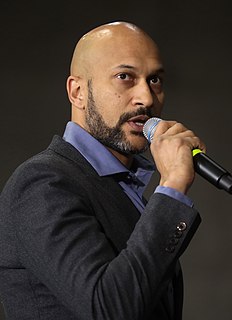A Quote by Keegan-Michael Key
You could figure out at least 80 percent of the context and meaning of a text if people used punctuation, and we wouldn't have had to write our sketch.
Related Quotes
When you hit send on a text or tweet, you lose ownership of it - but you don't lose responsibility. Every text you have sent may have been saved and could be out there waiting to be used in ways you didn't imagine. Even the most simple of posts can be used out of context, often unintentionally, and change your future.
Economists often talk about the 80/20 Principle, which is the idea that in any situation roughly 80 percent of the “work” will be done by 20 percent of the participants. In most societies, 20 percent of criminals commit 80 percent of crimes. Twenty percent of motorists cause 80 percent of all accidents. Twenty percent of beer drinkers drink 80 percent of all beer. When it comes to epidemics, though, this disproportionality becomes even more extreme: a tiny percentage of people do the majority of the work.
A text makes the word more specific. It really kind of defines it within the context in which it is being used. If it is just taken out of a context and presented as a sort of object, which is what - you know, which is a contemporary art idea, you know. It is like an old surrealist idea or an old cubist idea to take something out of context and put it in a completely different context. And it sort of gives it a different meaning and creates another world, another kind of world in which we enter.
People… they don’t write anymore – they blog. Instead of talking, they text, no punctuation, no grammar: LOL this and LMFAO that. You know, it just seems to me it’s just a bunch of stupid people pseudo-communicating with a bunch of other stupid people in a proto-language that resembles more what cavemen used to speak than the King’s English.
I read something in the paper that really confused me the other day. It said that 80 percent of the people in New York are minorities. Shouldn't you not call them minorities when they get to be 80 percent of the population? That's a very white attitude, don't you think? I mean, you could take a white guy to Africa and he'd be like 'Look at all the minorities around here! I'm the only majority.'
I just started trying to figure out how to write [something] which was unlike anything anybody had ever seen, and once I felt like I had figured that out I tried to figure out what kind of book I could write that would be unlike anything anybody had ever seen. When I started writing A Million Little Pieces I felt like it was the right story with the style I had been looking for, and I just kept going.
Every single aspect of a text requires very careful choices and rigorous evaluation. Style is employed - or deployed - for a reason. It's purposeful. Form and aesthetics are part of meaning-making. Ideally, a writer would have mastery over a wide variety of rhetorical gestures and tonalities, our lexicon and punctuation system, our grammar, and all the riches of a liberal and literary education.
Poetry, as odd as it is, and as hard to figure out as it is, many times, it's almost something that we're used to. It's kind of like a dream language that we had centuries ago, so that when we speak poetically or write a poem about what's going on, a real difficult issue that's facing our communities, people listen.




































